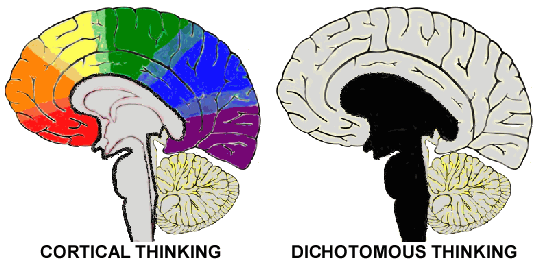The tragic loss of Michael Brown in Ferguson, Mo this summer will only be compounded if we don’t learn anything from it. As always, DT will stand in the way.
Did Michael Brown act the way Officer Wilson said he did, or is Wilson a bold faced liar? Did Wilson misinterpret Brown’s action? We could ask questions to help us come to a better understanding of what happened, but we will never know for sure. The critical question is, do we really have to know what actually happened to move forward?
The Ferguson issue is at the intersection of 2 fundamental human problems, racism and crime/punishment. With so much attention focused on the issue, this is a time for some genuine progress. Unfortunately DT is not only at the heart of the problem, but impedes progress in addressing the problem. Does the discussion of the issue have to be couched in the framework of whose version one believes, rather than the framework of addressing the problem?
Regardless of which version one believes, the following are true. Racism is real in this country and black people are often seen as scary to white people. Police in high crime areas feel the need to maintain an aggressive attitude towards the local community, especially when it comes to young black males. There is a perception that if the police were to back off from an aggressive stance, crime and lawlessness would go up.
The current protests have the goal of pointing out the negative consequences of these aggressive tactics. The result is the opposite as the violence just reinforces the preconceptions that black people are inherently violent. The Brown family said it best when they asked people not to make “noise.” (I wish we lived in a world where it would have been natural to have referred to it as “dichotomous noise”)
Police forces need to get the idea that their dichotomous actions may have a short term effect of deterring crime, but they are ignoring the long term consequences. They need to get how DT just leads to more DT. This will not come out of the Ferguson issue as long as protests are violent.
Every black family in America should have “The Talk” with their sons. Everyone, especially young black males should treat the police with deference, respect and cooperation. Why? Not because they are always right or good. Not because there tactics are not ultimately counter-productive and not because we believe Officer Wilson version. The reason the police should be treated with deference, respect and cooperation is because to do so is consistent with 2 goals we all generally share.
First, we want to survive and we want our children to survive. Regardless of what actually happened on the day Michael Brown died, mouthing off to or acting aggressively towards an armed police officer puts ones survival at risk. Second we want an orderly society in which we can live in peace and security. We can only have this with a functioning professional police force. Mouthing off and acting aggressively generates dichotomous noise that the police force simply echoes and amplifies. It increases the risk of unprofessional behavior on the part of the police. Makes them less effective and more likely to make mistakes.
Clearly this is not what will come out of the Ferguson issue. Why? Because of DT. Why should we take the first step? It’s their fault not ours. If we promote this idea now it will mean we believe Officer Wilson. It would mean Michael Brown deserved to be killed. It would mean it is Michael Brown’s parents fault for not having “The Talk” with him. In the end it looks like DT will win out over problem-solving again.
